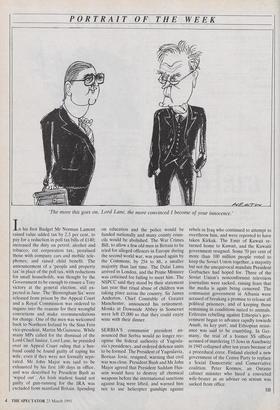PORTRAIT OF THE WEEK
'The more this goes on, Lord Lane, the more convinced I become of your innocence.'
In his first Budget Mr Norman Lamont raised value added tax by 2.5 per cent, to pay for a reduction in poll tax bills of £140; increased the duty on petrol, alcohol and tobacco; cut corporation tax; penalised those with company cars and mobile tele- phones; and raised child benefit. The announcement of a 'people and property tax' in place of the poll tax, with reductions for small households, was thought by the Government to be enough to ensure a Tory victory at the general election, still ex- pected in June. The 'Birmingham Six' were released from prison by the Appeal Court and a Royal Commission was ordered to inquire into the reasons for their wrongful convictions and make recommendations for change. One of the men was welcomed back to Northern Ireland by the Sinn Fein vice-president, Martin McGuinness. While many MPs called for the dismissal of the Lord Chief Justice, Lord Lane, he presided over an Appeal Court ruling that a hus- band could he found guilty of raping his wife, even if they were not formally sepa- rated. Mr John Major was said to be exhausted by his first 100 days in office, and was described by President Bush as 'wiped out'. An Irish student found not guilty of gun-running for the IRA was excluded from mainland Britain. Spending
on education and the police would be funded nationally and many county coun- cils would be abolished. The War Crimes Bill, to allow a few old men in Britain to be tried for alleged offences in Europe during the second world war, was passed again by the Commons, by 254 to 88, a smaller majority than last time. The Dalai Lama arrived in London, and the Prime Minister was criticised for failing to meet him. The NSPCC said they stood by their statement last year that ritual abuse of children was taking place across the country. Sir James Anderton, Chief Constable of Greater Manchester, announced his retirement. Monks at Downside Abbey in Somerset were left £5,000 so that they could enjoy wine with their dinner.
SERBIA'S communist president an- nounced that Serbia would no longer rec- ognise the federal authority of Yugosla- via's presidency, and ordered defence units to be formed. The President of Yugoslavia, Borisav Jovic, resigned, warning that civil war was close. President Bush and Mr John Major agreed that President Saddam Hus- sein would have to destroy all chemical weapons before the international sanctions against Iraq were lifted, and warned him not to use helicopter gunships against rebels in Iraq who continued to attempt to overthrow him, and were reported to have taken Kirkuk. The Emir of Kuwait re- turned home to Kuwait, and the Kuwaiti government resigned. Some 70 per cent of more than 100 million people voted to keep the Soviet Union together, a majority but not the unequivocal mandate President Gorbachev had hoped for. Three of the Soviet Union's nonconformist television journalists were sacked, raising fears that the media is again being censored. The communist government in Albania were accused of breaking a promise to release all political prisoners, and of keeping those remaining in conditions suited to animals. Eritreans rebelling against Ethiopia's gov- ernment began to advance rapidly towards Assab, its key port, and Ethiopian resist- ance was said to be crumbling. In Ger- many, the trial of a former SS officer accused of murdering 15 Jews in Auschwitz in 1945 collapsed after ten years because of a procedural error. Finland elected a new government of the Centre Party to replace a Social Democratic and Conservative coalition. Peter Kormos, an Ontario cabinet minister who hired a convicted wife-beater as an adviser on sexism was sacked from office.
SB


























































 Previous page
Previous page